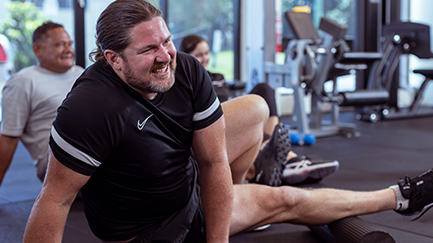
Supporting veterans through service related injuries
The Mates4Mates physical rehabilitation team is here to help veterans improve mobility, manage pain and enhance their overall wellbeing.

The holiday season can be a challenging time for veterans and their family members who have been impacted by service.
Post-traumatic stress disorder (PTSD), isolation and other challenges related to the holidays can be overwhelming or trigger an increase in symptoms.
Holidays can bring out the best in people but can also cause stress and tension. Shopping centres become more crowded and noisy and an increase in social activities can cause an exacerbation in anxiety and depression. Expectations of the ‘perfect holiday’ as often portrayed in the media can also be challenged by the reality of the holidays, further increasing distress and dissatisfaction.
Another common experience for veterans during the holiday season is feeling undeserving of celebrating and this may increase isolation. They may choose to not participate, avoid social events or use unhealthy strategies such as drinking alcohol to cope with an increase in anxious symptoms or to avoid painful memories.
Family members may also struggle as they cope with the demands of the season as well as the changes that may happen for their loved one who is struggling with PTSD or other mental health issues. Overall, this time of year can bring a sense of loneliness and guilt, and this can have a significant impact on relationships with friends and family and increase the likelihood of interpersonal conflict.
While some might find it difficult to acknowledge the challenges of the holiday season and find it hard to reach out for help as a result, there is support available and communication is key. Whether it be letting your loved ones know you can get overwhelmed during this time or speaking with other veterans who feel the same way, this intentional communication with others can help decrease the feelings of isolation.
If you are feeling overwhelmed, it’s okay to take time for yourself and step away from any situation if needed. Remember, you are just as deserving as anyone else in celebrating the holidays and you can use this time to engage in self-care and activities that are important to you and those you care about.
Over the holiday season, all Mates4Mates centres will be closed from Friday, 23 December 2022 to Monday, 2 January 2023. The centres will re-open on Tuesday, 3 January 2023.
If you or someone you know is in crisis and needs immediate support over the holiday period, contact 000 or attend your nearest hospital. For 24-hour support, phone Open Arms: 1800 011 046 or Lifeline: 13 11 14.
Written by Tamsin Wallace, Mates4Mates Psychologist

The Mates4Mates physical rehabilitation team is here to help veterans improve mobility, manage pain and enhance their overall wellbeing.